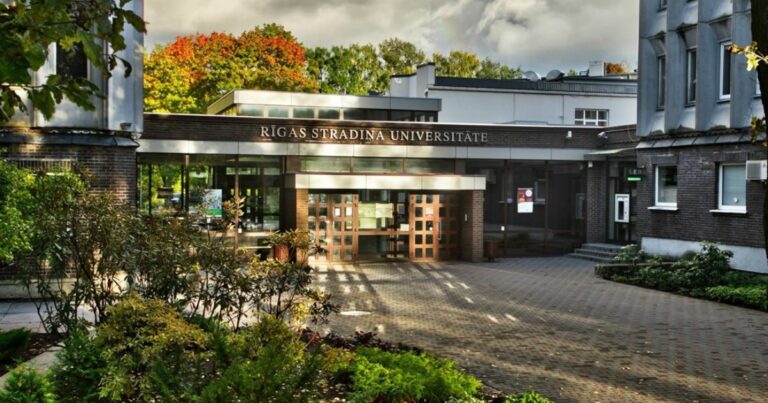Riga Stradiņš University is one of the most progressive universities in the Baltics in the fields of medicine, communication sciences, law and European studies.
The University has 9000 students and around 2000 international students from at least 60 countries. It is a university that teaches not only knowledge, but also the spirit of inclusion.
In a quiet corner of Riga, at Dzirciema iela 16, you’ll find a large white building with the inscription “Riga Stradiņš University” on the ground-floor wall. Most of the teaching takes place here, but there are other places to study, such as the Medical Education Technology Centre at Anniņmuižas Boulevard 26a, and the RSU scientific centre “Kleisti” at Rātsupītes Street. 5. Or dentistry students will be welcome at SIA “RSU Institute of Stomatology” at Dzirciema Street 20, Kurzeme District, Riga, LV-1007.
Historical heritage
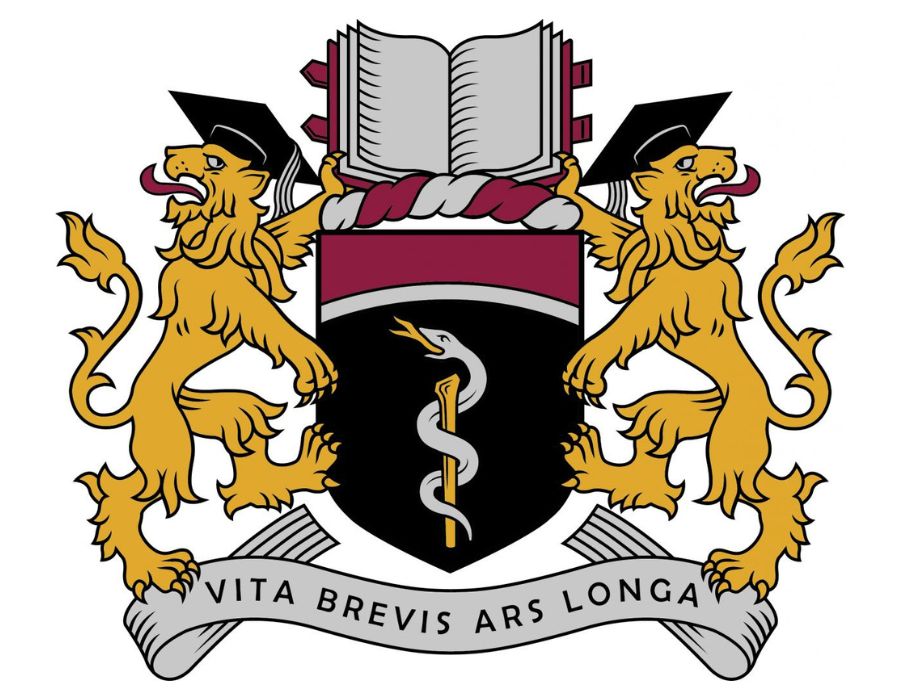
The year of 1950 is considered to be the first year of the University’s history. In that year, the patron Kristaps Morbergs donated premises in Riga, Z.A. Meirovica Boulevard 12 to the Riga Medical Institute, the predecessor of RSU.
The surname of the Stradiņi family
Paul Stradiņš once said that his legacy should be a clinic, a school of surgeons and a museum, but that is not why Paul Stradiņš’s name is in the name of the university. There is a good reason for that. Members of the Stradiņš family have had a significant influence on Latvian academic life for several centuries.
The professional and operational activities of Pauls Stradins ensured the inheritance of the values, standards and quality of medical education. During his lifetime, Pauls Stradiņš managed to be a lecturer at the University of Latvia, the founder of a medical school, the chief physician of a clinical hospital and so much more.
Student life
Studying requires a lot of hard work, but the student’s life doesn’t stop after the school day. School offers students the opportunity to get involved in artistic groups, such as : science clubs, student organizations, student self-government, as well as many festivals and events, such as :
- Matriculation ceremony;
- White Gown Festival;
- Academic meeting;
- Sports Day;
- Science Week;
- Graduation;
- Scientific Conference;
- Academic Ball;
- Open Day.
Student organisations
As previously mentioned, Riga Stradiņš university has always cared not only for studies but also about community feeling. University provides many opportunities to develop and prove yourself as promising young researcher, basketball player or dancer.
You can travel the world with the mixed choir group or dance in folk dance group. You can be a participant in The Latvian Medical Student Association or be a future photographer, multimedia specialist, journalist and public relations specialist in The Rīga Stradiņš University student media network “Skaļāk” (Louder). Or if your interests are not that specific the International Students’ Association will always welcome new students.
Studies in Latvia
So if you are interested in spending a semester/year abroad at Rīga Stradiņš University as part of the Erasmus+ programme, there is definitely a chance for you. But before studies there are some prerequisites.
The main one is that, the applicant must comply with the Erasmus+ student mobility eligibility criteria. There should be an existing Erasmus Agreement between the student’s home university and Rīga Stradiņš University.
Study courses in English
You heard it right! University provides an entire study programmes that is offered in English. Per example, in studies of medicine, students are allowed to choose study subjects within the framework of study year 4 and/or 5 and/or 6. A combination of study courses from Year 4 and 5 is possible. Overlaps may occur.
Other studies, such as Faculty of European Studies and Communication are taught via modular system, an extensive and rigorous work for four weeks. At the end of which students have to pass an exam. In the modular system, most modules take one month to complete, while others extend over the full semester (long modules).
Living in Riga

University has always cared about students in and outside class rooms. So university provides its students different hostel options :
• RSU Student Hostel in “Dzirciems” in Rīga, Dārza iela 5 is located right next to the RSU main building.
• RSU Student Hostel in “Āgenskalns” in Rīga, Mārupes iela 17 is in 5 minutes walk from university.
• RSU Student Hostel in “Mežciems” in Rīga, Hipokrāta iela 3 is in 80 minute ride from RSU main building, by public transport.
Room prices are fixed and include utility costs, such as heating, electricity, water, and administrative and maintenance costs. Before moving in, you have to pay the rent for the first month and a security deposit which is equivalent to one month’s rent. This will be refunded within 4 weeks after the end of your rental contract.
Each room has a bed with a pillow, blanket, bed sheets, desk, chair, shelf and a closet.
RSU faculties
It is no secret that RSU is a university that is overcrowded with medical students. Everyone who wants to be a knowledgeable and good doctor starts their studies at the university, but it should be mentioned that today the university has opened 9 faculties, where you can study many subjects, not only medicine:
- Faculty of Law
- Faculty of European Studies
- Faculty of Pharmacy
- Faculty of Communications
- Faculty of Medicine
- Faculty of Rehabilitation
- Faculty of Public Health and Social Care
- Faculty of Dentistry
- Faculty of Residency
Faculty of Law

By studying law at Riga Stradiņš University, people can gain an understanding of legal systems and their impact on society, as well as the skills needed to become a lawyer or a member of other legal professions.
Pursuing a career in law provides the opportunity to advocate for individuals and organisations, provide legal advice and guidance, and contribute to the development and interpretation of the law.
Faculty of European Studies

European Studies contributes to an understanding of Europe’s political, economic and cultural dynamics, including its history, institutions and current developments. It also provides a broad knowledge of the European Union and its role in the world. In addition, it can provide career opportunities in international organisations, diplomacy, journalism, business and elsewhere.
A degree in European Studies can lead to a variety of career paths, both within Europe and internationally. Some potential career options include:
- Diplomacy and International Relations: A degree in European Studies can provide you with the knowledge and skills required to work in diplomacy or international relations. You could work for a government agency, an international organization, or a non-profit organization, promoting cooperation and understanding between European countries and the rest of the world.
- European Union (EU) Institutions: Graduates in European Studies can work in the EU institutions, such as the European Commission, the European Parliament, or the Council of the European Union.
- Journalism and Media: A degree in European Studies can also lead to a career in journalism or media. You could work as a correspondent, covering European affairs for a news outlet, or as a researcher, analyzing data and trends in European politics and society.
- Business and Consulting: European Studies graduates can also work in business or consulting, providing insight and analysis on the European market and its cultural, political, and social dynamics. This can be particularly useful for companies seeking to expand their operations in Europe or for those looking to work with European partners.
- Academia and Research: A degree in European Studies can also lead to a career in academia or research, pursuing further study or working in research institutes, think tanks, or non-governmental organizations.
Faculty of Pharmacy

Studying pharmacy can provide knowledge of pharmaceutical products, anatomy and physiology, pharmacology and patient counseling. Pharmacists play an important role in promoting public health and preventing diseases. Studying pharmacy also opens up career opportunities in various fields such as hospitals, retail pharmacies, research and development, etc.
Here are some potential career options for graduates with a Pharmacy degree:
- Community Pharmacist: This is the most traditional and popular career path for Pharmacy graduates. As a community pharmacist, you will dispense medications to patients, advise them on drug interactions, side effects, and dosage, and work with other healthcare professionals to ensure optimal patient care.
- Hospital Pharmacist: Hospital pharmacists work in hospital settings, and are responsible for ensuring that patients receive the correct medications and doses. They work closely with doctors, nurses, and other healthcare professionals to manage patients’ medications and monitor their progress.
- Pharmaceutical Industry: A Pharmacy degree can also lead to a career in the pharmaceutical industry. Graduates can work in research and development, quality control, regulatory affairs, or marketing and sales, among other areas.
- Academic and Research: A degree in Pharmacy can also prepare graduates for careers in academia and research. They can work in universities, research institutions, or pharmaceutical companies, conducting research and developing new medications and therapies.
- Government and Regulatory Affairs: Graduates with a Pharmacy degree can also work in government and regulatory affairs, ensuring that medications are safe and effective for patients. They can work for government agencies such as the Food and Drug Administration (FDA) or for pharmaceutical companies.
- Clinical Trials Researcher: Clinical trials are an essential part of developing new medications and therapies. Graduates with a Pharmacy degree can work as clinical trials researchers, designing and conducting trials to test the safety and efficacy of new medications and therapies.
Faculty of Communications

Communication studies help people develop effective communication skills that are valuable in a variety of personal and professional contexts. It covers subjects such as interpersonal communication, public speaking, media, digital media and more.
Communication studies also provide insights into how messages are created, transmitted and received, as well as the impact of the media on society. It can help you build a career in journalism, marketing, public relations, advertising, media production and more.
Here are some potential career options for graduates with a Communications degree:
- Public Relations (PR) Specialist: PR specialists work to create and maintain a positive image for companies or organizations. They develop and implement PR strategies, create content for press releases and social media, and communicate with the media to get positive coverage for their clients.
- Marketing Specialist: Marketing specialists work to promote products or services for companies or organizations. They create and implement marketing strategies, conduct market research, and develop advertising campaigns.
- Media Planner: Media planners work with advertising agencies to develop effective media campaigns for clients. They analyze data on consumer demographics and media usage to determine the best channels for reaching their target audience.
- Content Creator: Content creators develop and produce content for a variety of platforms, including social media, blogs, websites, and video. They may write articles, create videos or podcasts, or design graphics and other visual elements.
- Corporate Communications: Corporate communications specialists work within companies to develop and implement internal and external communications strategies. They may be responsible for writing press releases, creating employee newsletters, or managing social media accounts.
- Event Planner: Event planners coordinate and manage events such as conferences, trade shows, and product launches. They may be responsible for everything from venue selection and budget management to marketing and promotion.
- Journalism: Communications graduates can also pursue a career in journalism, working as reporters, editors, or producers for print, broadcast, or online media outlets.
Faculty of Medicine
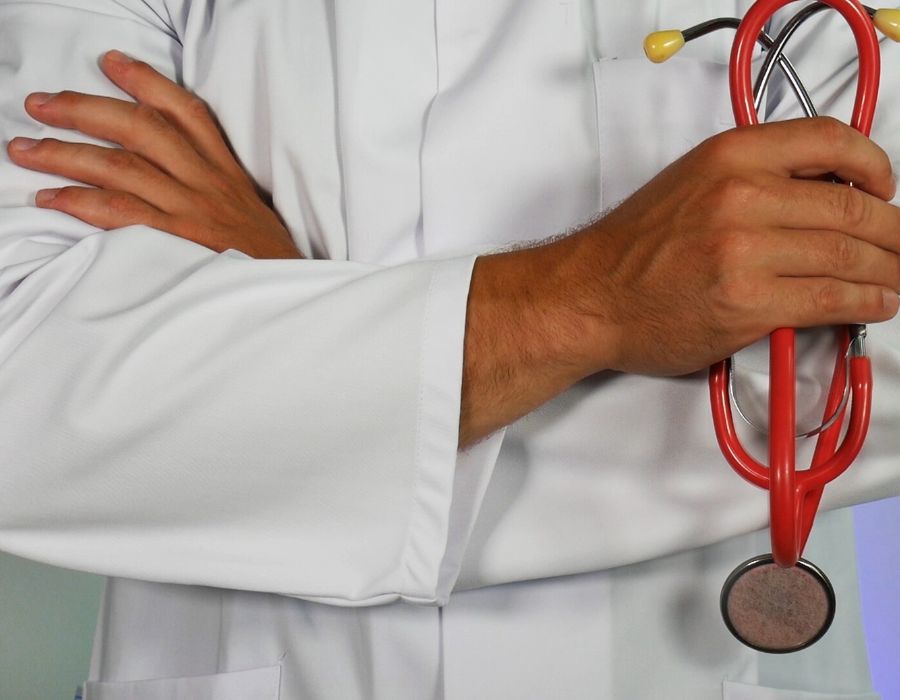
Medical studies provide students with a comprehensive education in human health and disease, including anatomy, physiology, pharmacology, diagnosis and treatment, among other areas.
By studying medicine, people can acquire the knowledge and skills needed to become a doctor or other health professional such as a nurse, dentist or physiotherapist.
Here are some potential career options for graduates with a Medicine degree:
- Physician: Physicians diagnose and treat a variety of medical conditions. They may specialize in a particular area of medicine, such as cardiology, pediatrics, or neurology. Physicians can work in hospitals, clinics, private practices, or other healthcare settings.
- Surgeon: Surgeons perform surgical procedures to treat a variety of medical conditions. They may specialize in a particular area of surgery, such as orthopedics, neurosurgery, or cardiovascular surgery.
- Medical Researcher: Medical researchers conduct research to improve our understanding of medical conditions and to develop new treatments and therapies. They may work in academic or research institutions, pharmaceutical companies, or government agencies.
- Medical Educator: Medical educators teach medical students and other healthcare professionals. They may work in medical schools, teaching hospitals, or other educational institutions.
- Public Health Professional: Public health professionals work to prevent and control diseases in populations. They may work in government agencies, non-profit organizations, or international organizations, developing and implementing public health policies and programs.
- Healthcare Administrator: Healthcare administrators manage healthcare facilities, such as hospitals or clinics. They may be responsible for budgeting, staffing, and overseeing day-to-day operations.
- Medical Consultant: Medical consultants provide expert advice on medical issues to other healthcare professionals or organizations. They may work as independent consultants or for consulting firms.
Faculty of Rehabilitation

Rehabilitation studies include anatomy, physiology, bio-mechanics and the principles of rehabilitation of different diseases. Rehabilitation professionals such as physiotherapists, occupational therapists and speech and language therapists play a crucial role in improving the quality of life of people with disabilities or recovering from injury.
By studying rehabilitation, people can gain the skills and knowledge they need to pursue a career in the field and make a difference to the lives of others.
Here are some potential career options for graduates with a Rehabilitation degree:
- Occupational Therapist: Occupational therapists help individuals with disabilities or injuries improve their ability to perform everyday activities. They may work with children or adults and may specialize in a particular area, such as mental health or rehabilitation.
- Physical Therapist: Physical therapists help individuals recover from injuries or illnesses and improve their movement and mobility. They may work in hospitals, clinics, or private practices.
- Speech-Language Pathologist: Speech-language pathologists help individuals with communication and swallowing disorders. They may work in hospitals, schools, or rehabilitation centers.
- Rehabilitation Counselor: Rehabilitation counselors work with individuals with disabilities to help them overcome barriers to employment, education, or independent living. They may work in government agencies, non-profit organizations, or rehabilitation centers.
- Rehabilitation Specialist: Rehabilitation specialists provide support and assistance to individuals with disabilities or injuries to help them improve their quality of life. They may work in hospitals, clinics, or non-profit organizations.
- Case Manager: Case managers work with individuals with disabilities or chronic illnesses to coordinate their care and services. They may work in hospitals, insurance companies, or government agencies.
- Social Worker: Social workers help individuals and families overcome social and emotional challenges. They may work in hospitals, schools, or community organizations.
Faculty of Public Health and Social Care

Riga Stradiņš University’s Public Health and Social Care studies prepare people to tackle the complex health and social problems faced by communities. The curriculum covers topics such as health promotion, disease prevention, health policy, epidemiology and social care practice.
Career opportunities in this field can include positions in public health agencies, non-profit organisations, government and elsewhere.
Here are some potential career options for graduates with a Public Health and Social Care degree:
- Health Educator: Health educators develop and implement educational programs to promote healthy behaviors and prevent diseases. They may work in schools, community organizations, or government agencies.
- Community Health Worker: Community health workers provide support and assistance to individuals and families in underserved communities. They may help individuals access healthcare services, provide health education, or advocate for community health needs.
- Social Worker: Social workers help individuals and families overcome social and emotional challenges. They may work in hospitals, schools, or community organizations.
- Public Health Researcher: Public health researchers conduct research to improve our understanding of health issues and to develop new public health policies and programs. They may work in academic or research institutions, government agencies, or non-profit organizations.
- Healthcare Administrator: Healthcare administrators manage healthcare facilities, such as hospitals or clinics. They may be responsible for budgeting, staffing, and overseeing day-to-day operations.
- Epidemiologist: Epidemiologists investigate patterns and causes of diseases and injuries in populations. They may work in government agencies, non-profit organizations, or academic or research institutions.
- Health Policy Analyst: Health policy analysts develop and analyze healthcare policies and programs. They may work in government agencies, insurance companies, or non-profit organizations.
Faculty of Dentistry
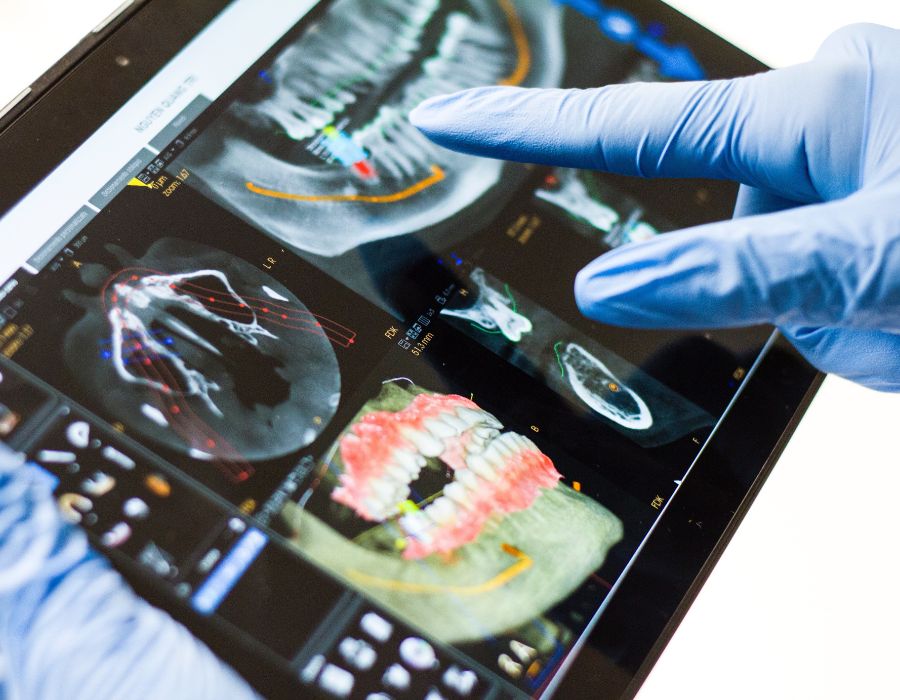
By studying dentistry, people can acquire the knowledge and skills needed to become a dentist or dental hygienist. Dentists play an important role in promoting oral health and preventing oral diseases, as well as improving the general health and well-being of patients.
A career in dentistry provides an opportunity to make a positive impact on people’s lives and to contribute to the development of dental knowledge and practice.
Here are some potential career options for graduates with a Dentistry degree:
- General Dentist: General dentists diagnose and treat a variety of dental conditions, such as cavities, gum disease, and tooth decay. They may also provide preventive care, such as cleanings and exams.
- Pediatric Dentist: Pediatric dentists specialize in providing dental care to children. They may work in private practice or in hospitals or clinics.
- Orthodontist: Orthodontists specialize in the diagnosis, prevention, and correction of dental and facial irregularities. They may use braces, aligners, or other appliances to straighten teeth and improve oral health.
- Endodontist: Endodontists specialize in the treatment of the dental pulp and tissues surrounding the roots of teeth. They may perform root canal procedures or other treatments to preserve damaged or infected teeth.
- Periodontist: Periodontists specialize in the treatment of gum disease and other conditions affecting the soft tissues and bones surrounding the teeth. They may perform surgeries or other procedures to treat periodontal disease.
- Oral and Maxillofacial Surgeon: Oral and maxillofacial surgeons specialize in the diagnosis and treatment of conditions affecting the mouth, teeth, jaws, and face. They may perform surgeries to remove impacted teeth, treat facial injuries, or correct facial deformities.
- Dental Educator: Dental educators teach dental students and other healthcare professionals. They may work in dental schools or other educational institutions.
RSU Museum of anatomy
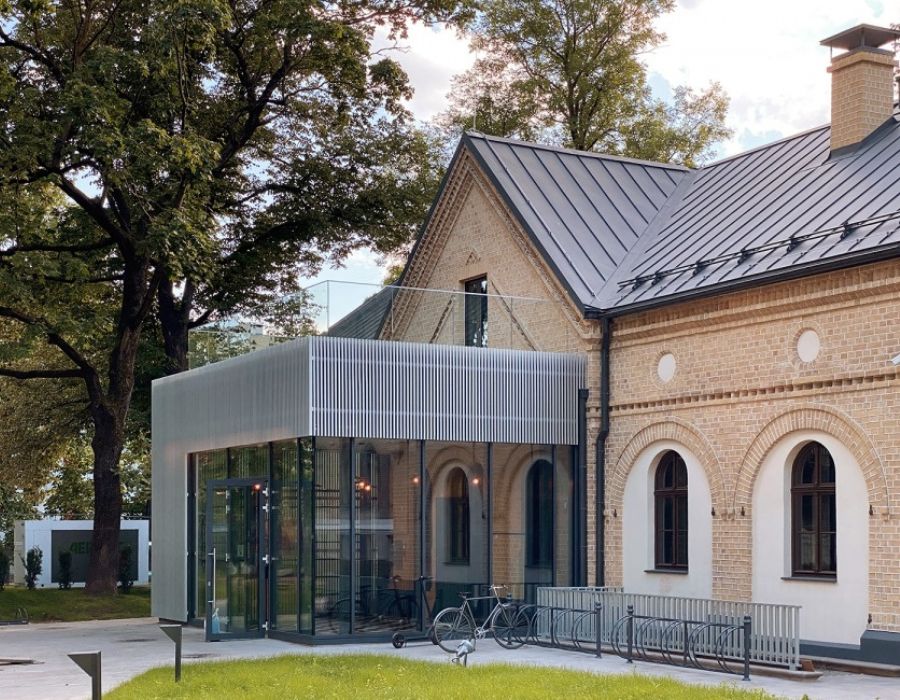
Riga Stradiņš University is a university with a very rich history. So big that it even requires an open museum. The museum is based on the first anatomy teaching collection in Latvia, created in an anatomical museum in the 20th century. In the RSU Museum’s collection you will find various materials such as audio and audiovisual recordings, electronic documents, photographs and other cultural and historical treasures relating to the university’s existence since 1950.
I hope you have found this article useful. If you are already have finished your studies and are looking for the perfect work place, we suggest you to read the article Happy employees are the key to a successful company – Efectio story
